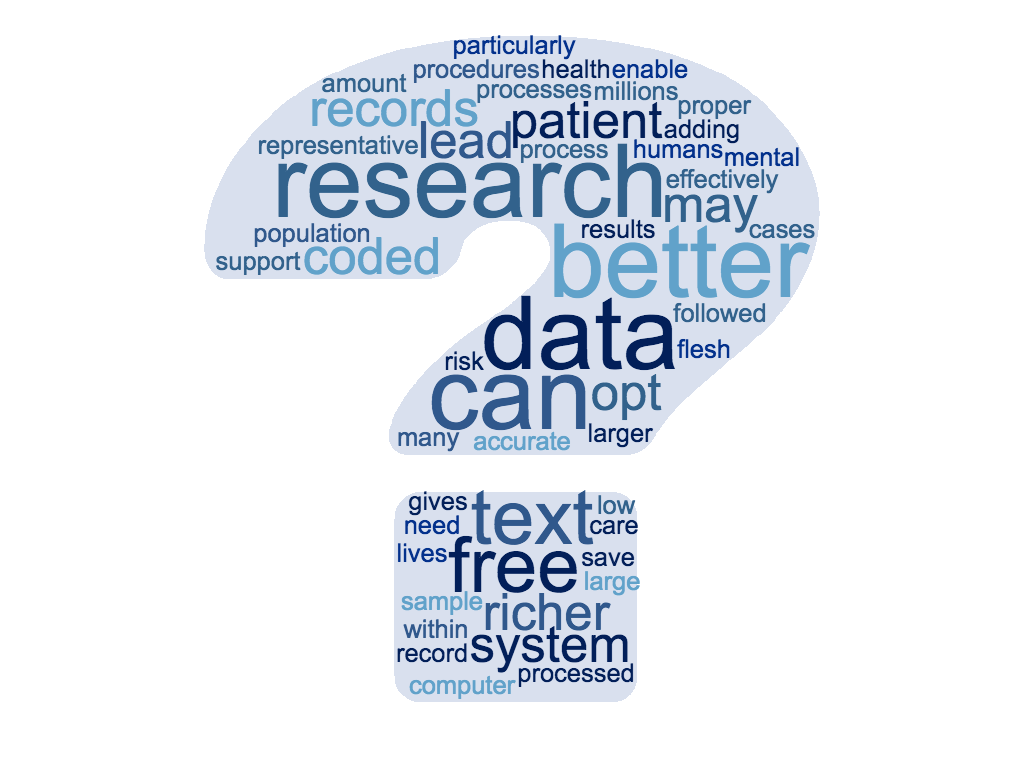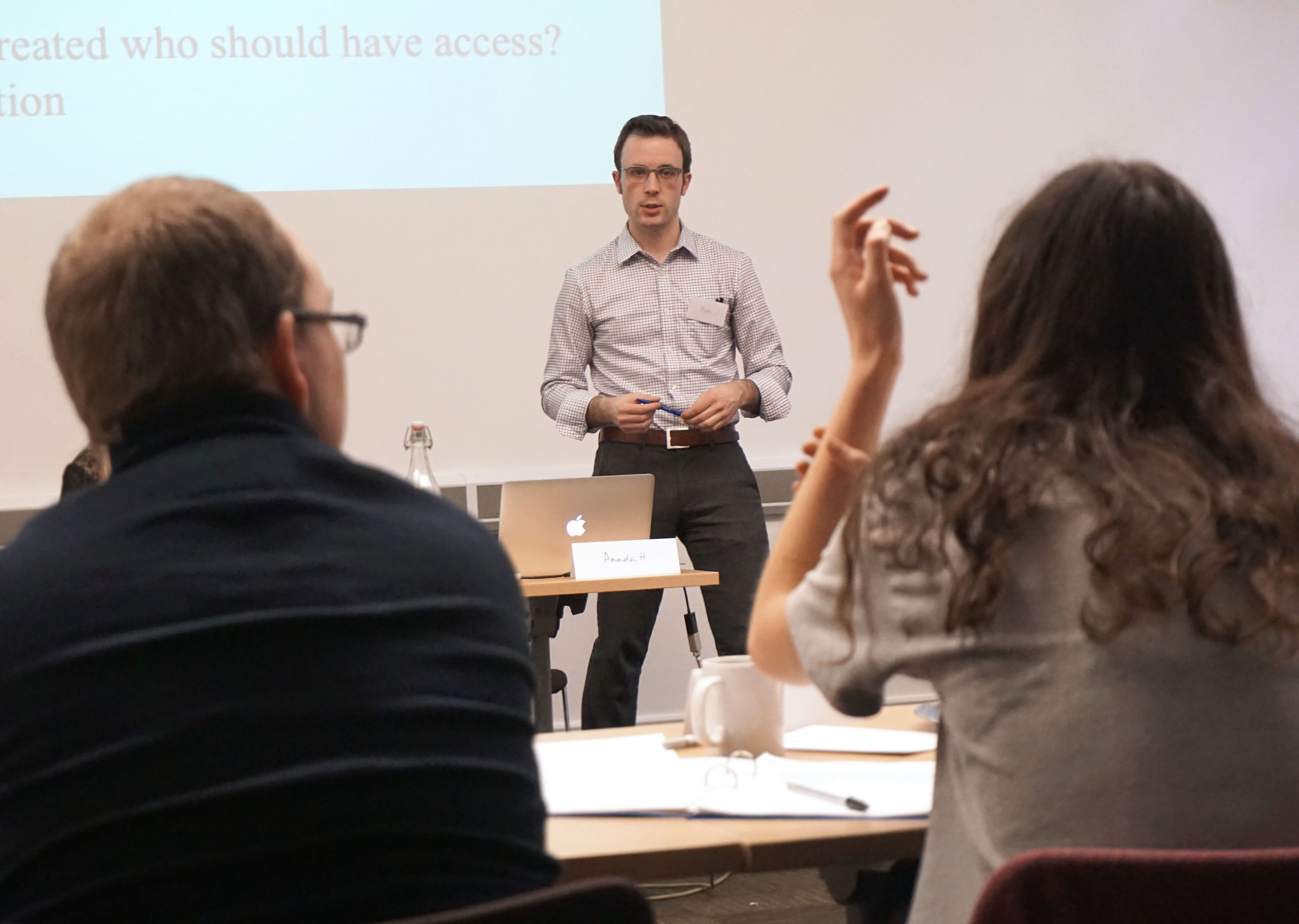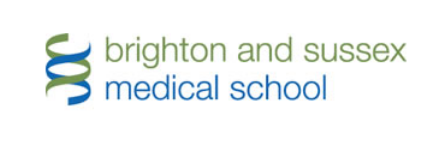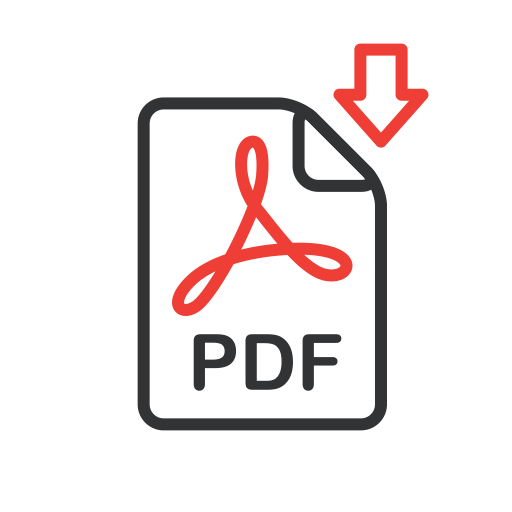Clinical information written in patients’ medical notes contains a wealth of information which could be unlocked for research to improve population health and wellbeing. However, in many cases, researchers are refused access to this written text because of concerns about privacy breaches. Much is known about public attitudes to the use of health data in general (see, for example, reports from Connected Health cities citizens’ juries). However, to date no research has asked whether the public feel differently about use of structured and unstructured data. Despite this, data custodians routinely remove free-text data from datasets provided for research. Addressing this gap in knowledge of public opinion is a crucial step towards informing and influencing custodians’ data access policies.

Healtex, Brighton and Sussex Medical School and Citizens’ Juries c.i.c. organised a three-day “citizens’ jury” between 6th and 8th June 2018 to understand whether, and under what conditions, the public would accept medical free text data being used for research. Citizens’ juries are a recognised methodology for deliberative research with the public, established over 40 years ago by the Jefferson Center in the USA.
This was the first study to ask the public what they think about de-identified clinical narrative being used for secondary purposes. The citizens’ jury with 18 people, comprising a cross-section of the public, have learnt from expert witnesses over three days about structured and unstructured health data, and the challenges, needs and opportunities in processing free text data. The jury deliberated together, exploring the complexities and potential trade-offs between privacy and the public good, and reached reasoned conclusions about whether and under what circumstances use of free-text data for medical research can be justified.

“As a researcher I found watching and taking part in the jury a fascinating process, especially watching Kyle, Lamiece and Malcolm facilitate the discussions in a way that tried to minimise any influence on the results. The whole jury process was incredibly uplifting, as jurors appreciated having their voices heard, and being trusted to give opinions which could influence national policy.” Dr Elizabeth Ford, (PI).
Key findings
The results from the citizens’ jury show broad support for the use of free-text health data being used for health-related research. The jury was slightly more cautious about using free-text than coded health data for research but were nevertheless broadly supportive as long as there was a transparent process for patients to easily opt out of their data being used in this way.
Download the summary paper:
Ford E, Oswald M, Hassan L, Bozentko K, Nenadic G, Cassell J: Should free-text data in electronic medical records be shared for research? A citizens’ jury study in the UK. Journal of Medical Ethics 2020;46:367-377
Organisation
Dr Elizabeth Ford, Lecturer in Research Methodology at Brighton and Sussex Medical School was the principal investigator. Brighton and Sussex Medical School, funded through Healtex, commissioned Citizens Juries c.i.c. working in partnership with the Jefferson Center to recruit the jury members, and design and run the citizens’ jury. Dr Malcolm Oswald, Director of Citizens Juries c.i.c., led the citizens’ jury project. Kyle Bozentko, Director of the Jefferson Center, and Dr Lamiece Hassan, Research Fellow at the University of Manchester, facilitated the three-day jury.
Oversight panel
The independent Oversight Panel reviewed the jury design and materials:
Expert witnesses
The following expert witnesses presented the case
- Prof Jackie Cassell, trained as a medical doctor, now the Head of at Department of Primary Care and Public Health at Brighton and Sussex Medical School
- Prof John Carroll, Professor of Computational Linguistics, Department of Informatics, University of Sussex
- Dr Elizabeth Ford, Lecturer in Research Methodology, Brighton and Sussex Medical School
- Prof Bobbie Farsides, Professor of Clinical and Biomedical Ethics, Brighton and Sussex Medical School
- Dr Jon Fistein, trained as a medical doctor and barrister, now Associate Professor in Clinical Informatics at the University of Leeds
- Dr Angus Roberts, Senior Lecturer in Health Informatics, King’s College London
- Mr Phil Booth, Co-ordinator, medConfidential
“This experience really opened my eyes to research programmes..the process I felt it was peeling away layers of an onion to get to real decisive issues”. Anna (juror)
Jury documents
Jury design documents
| Name | Brief description | Reviewed by Oversight Panel? |
| Healtex citizens jury specification | A specification of the design for the citizens’ jury, including the jury questions and juror selection criteria | Yes |
| Citizens jury planned schedule | An overview of the morning and afternoon activities for all three days of the citizens’ jury. | Yes |
| Brief for expert witnesses Jan 2018 jury v1 | A brief provided to all six expert witnesses to guide their presentations to the juries, including a specific brief for each named witness. | Yes |
| Citizens jury oversight panel brief | A brief to the three members of the oversight panel (Mary Tully, Dawn Monaghan and Jenny Westaway) describing their role to monitor bias. | Yes |
| Oversight panel signed questionnaires | The set of forms completed and signed by the three members of the oversight panel with their assessments and statements on bias. | Yes |
| Jury recruitment questionnaire | The form completed by people applying to be jurors (an electronic equivalent was used for web applications) | Yes |
| End of jury questionnaire | The questionnaire that all jurors completed at the end of day 3 of the jury process. | Yes |
| Jefferson Center bias questionnaire | A form designed and used by the Jefferson Center to capture feedback from the jurors, particularly about potential bias, at the end of day 1 and day 2. | No (standard Jefferson Center form) |
Materials
| Name | Brief description | Reviewed by Oversight Panel? |
| Jurors ring binder contents | A folder of materials produced by Citizens’ Juries c.i.c. and the Jefferson Center, printed out and provided in a ring binder to each jury member. It has 20 sections including a table of contents (section 0), all the slides from the expert witnesses, and the exercises carried out by jury members. | Yes, except for standard sections (1, 6 and 7) |
| Juror handouts | Paper handouts provided to jury members during the course of the three-day event with exemplar answers to the jury exercises. | Yes |
Outputs
| Name | Brief description |
| Jurors report | A report of the jury conclusions produced by Kyle Bozentko of the Jefferson Center on day 3 of jury with the 18 jurors. |
| Free text health data sharing jury report | The report summarising the design and findings of the citizens’ jury. |
| Jury word cloud | A word cloud generated automatically using the answers given by the jurors in the end of jury questionnaire to the question: “Overall, what was it like participating in the citizens’ jury over the three days? Please say 3 things in 3 words to sum up your experience.” |
| End of jury questionnaire results | Summary results of the questionnaires completed by members of the jury at the end of day 3. |
| Jury Q1 to Q5 answers | A summary of the answers given by the jury to jury questions 1 to 5 |
| Jury Q6 to Q8 answers | A summary of the answers given by the jury to jury questions 6 to 8 |
| Detailed jury results | Summary of forms completed by jurors to capture feedback from the jurors, particularly about potential bias, at the end of day 1 and day 2. |
| Daily bias questionnaire results | A summary of the results from the daily bias questionnaire completed by jurors at the end of day 1 and day 2. |
Notes
- Other than where specified, the main author of the documentation above was Dr. Malcolm Oswald, Director of Citizens Juries c.i.c.. Reviewers varied depending on the nature of the document.
- The Oversight Panel brief was to review the main jury design documentation, but not the jury outputs.





